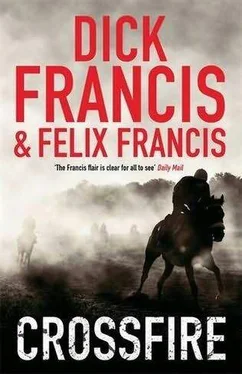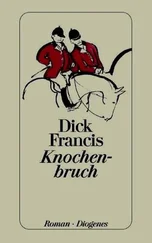Dick Francis - Crossfire
Здесь есть возможность читать онлайн «Dick Francis - Crossfire» весь текст электронной книги совершенно бесплатно (целиком полную версию без сокращений). В некоторых случаях можно слушать аудио, скачать через торрент в формате fb2 и присутствует краткое содержание. Жанр: Боевик, на английском языке. Описание произведения, (предисловие) а так же отзывы посетителей доступны на портале библиотеки ЛибКат.
- Название:Crossfire
- Автор:
- Жанр:
- Год:неизвестен
- ISBN:нет данных
- Рейтинг книги:3 / 5. Голосов: 1
-
Избранное:Добавить в избранное
- Отзывы:
-
Ваша оценка:
- 60
- 1
- 2
- 3
- 4
- 5
Crossfire: краткое содержание, описание и аннотация
Предлагаем к чтению аннотацию, описание, краткое содержание или предисловие (зависит от того, что написал сам автор книги «Crossfire»). Если вы не нашли необходимую информацию о книге — напишите в комментариях, мы постараемся отыскать её.
Crossfire — читать онлайн бесплатно полную книгу (весь текст) целиком
Ниже представлен текст книги, разбитый по страницам. Система сохранения места последней прочитанной страницы, позволяет с удобством читать онлайн бесплатно книгу «Crossfire», без необходимости каждый раз заново искать на чём Вы остановились. Поставьте закладку, и сможете в любой момент перейти на страницу, на которой закончили чтение.
Интервал:
Закладка:
The coroner went on to say that the body of the deceased had been identified by his sister, Mrs. Stella Beecher, of the same address. Another lie. Had the whole identification been a lie? Was the body found in the car actually that of Roderick Ward, or of someone else? And where was Stella Beecher now? Why wasn't she here? The whole business seemed fishy to me, but only because I knew that Roderick Ward himself had been busily working outside the law. To everyone else it was a simple but tragic road accident.
The first witness was a policeman from the Thames Valley Road Traffic Accident Investigation Team, who described the circumstances, as he had determined them, surrounding the death of Roderick Ward on the night of Sunday, July 12.
"Mr. Ward's dark blue Renault Megane had been proceeding along the A415 in a southerly direction," he said formally. "The tire marks on the grass verge indicate that the driver failed to negotiate the bend, veered over to the wrong side of the road and struck the concrete parapet of the bridge where the A415 crosses over the River Windrush. The vehicle appeared to have then gone into the river, where it was found by a fisherman at eight a.m. on the morning of Monday, July thirteenth. The vehicle was lying on its side with just six inches or so of it visible above the water level."
The coroner stopped him there as he made some handwritten notes. "Go on," he said eventually, looking up at the policeman.
"The vehicle was removed from the river by crane later that morning, at approximately ten-thirty. The deceased's body was discovered inside the vehicle when it was lifted. He was still strapped into the driver's seat by his seat belt. The Coroner's Office was immediately informed, and a pathologist attended the scene, arriving at"-he consulted his notebook-"eleven twenty-eight, by which time I had also arrived at the scene to begin my investigation."
The policeman paused again as the coroner wrote furiously in his own notebook. When the writing paused, the policeman went on.
"I examined the vehicle both at the scene and also at our vehicle-testing facility in Kidlington. It had been slightly damaged by the collision with the bridge but, other than that, was found to be in full working order with no deficiencies observed in either the braking or the steering. The seat belts were also noted to be in perfect condition, locking and unlocking with ease. At the scene I examined the concrete parapet of the bridge and the tire skid marks on the grass verge. There were no marks visible on the road surface. It appeared to me from my examinations that while the vehicle had struck the bridge wall, this collision in itself was unlikely to have been of sufficient force to prove fatal. While it was noted that the airbag in the vehicle had deployed, the damage to both vehicle and bridge indicated that the collision was minor and had occurred at a relatively low speed."
He paused and drank some water from a glass.
"From the position and directions of the marks on the grass and the lack of skid marks on the road, I conclude that the driver might have fallen asleep at the wheel, been awakened when the vehicle rose up onto the grass verge, had then braked hard, slowing the vehicle to between ten and fifteen miles per hour, before it struck the bridge parapet. The force of the collision, although fairly minor, had been sufficient to bounce the vehicle sideways into the river, the damage to the car and the bridge being consistent with that conclusion."
The policeman stopped and waited while the coroner continued to make notes.
"Has anyone any questions for this officer," said the coroner, raising his head from his notebook.
"Yes, sir," said a tall gentleman in a pin-striped suit, standing up.
The coroner nodded at him, clearly in recognition.
"Officer," the tall man said, turning to the policeman in the witness box. "In your opinion, would this life have been saved if a crash barrier had been fitted at the point where the car went off the road into the water?"
"Most probably, yes," said the policeman.
"And would you agree with me," the pin-striped suit went on, "in your capacity as a senior police accident investigator, that the failure of the Oxfordshire County Council to erect a crash barrier at that known accident black spot was tantamount to negligence on their behalf, negligence that resulted in the death of Roderick Ward?"
"Objection," said another suit, also standing up. "Counsel is leading the witness."
"Thank you, Mr. Sims," said the coroner. "I know the procedures of this court." He turned towards the first suit."Now, Mr. Hoogland, I agreed that you could ask questions of the witnesses in this case, but you know as well as I do that the purpose of this court is to determine the circumstances of death and not to apportion blame."
"Yes, sir," replied Mr. Hoogland, "but it can be within the remit of this court to determine if there has been some failure in the system. It is my client's position that a systematic failure by the county council to address the safety of the public at this point on the highway network has contributed to the death of Mr. Ward."
"Thank you, Mr. Hoogland. I am also well aware of the remits and responsibilities of this court." The coroner was clearly not amused at being lectured in his own courtroom. "However, your question of the officer was whether, in his opinion, there had been negligence in the matter of this death. This question is not answerable by this court, and would be better asked in any civil case that may be brought in a county court." He turned to the witness. "I uphold Mr. Sims's objection. Officer, you need not answer Mr. Hoogland's question."
The policeman looked relieved.
"Are there any further questions of this witness?"
There was no fresh movement from Mr. Hoogland other than to sit down. He had made his point.
However, I now wanted to stand up and ask the officer if, in his opinion as a senior police accident investigator, the circumstances of this death could have been staged such that it only appeared that the deceased had fallen asleep, hit the bridge and ended up in the river, when, in fact, he had been murdered?
But of course I didn't. Instead, I sat quietly in the public gallery in frustration, wondering why I was suddenly becoming obsessed with the idea that Roderick Ward had been murdered. What evidence did I have? None. And indeed, was the deceased actually Roderick Ward in the first place?
"Thank you, officer," said the coroner. "You may step down, but please remain within the vicinity of the court in case you are needed again."
The policeman left the witness box and was replaced by a balding, white-haired man with half-moon spectacles and wearing a tweed suit. He stated his name as Dr. Geoffrey Vegas, resident pathologist at the John Radcliffe Hospital in Oxford.
"Now, Dr. Vegas," said the coroner, "can you please tell the court what knowledge you have concerning the deceased, Mr. Roderick Ward?"
"Certainly," replied the doctor, removing some papers from the inside pocket of his jacket. "On the morning of July thirteenth I was asked to attend the scene of an RTA-a road traffic accident-near Newbridge, where a body had been discovered in a submerged vehicle. When I arrived at the scene the body was still in the car, but the car had been lifted from the river and was on the road. I examined the body in situ and confirmed that it was of a male adult and that life was extinct. I gave instructions that the body be removed to my laboratory at the John Radcliffe."
"Did you notice any external injuries?" asked the coroner.
"Not at that time," replied the doctor. "The surface of the skin had suffered from immersion in the water, and the extremities and the face were somewhat bloated. The cramped conditions in the car did not lend themselves to more than a limited examination."
Читать дальшеИнтервал:
Закладка:
Похожие книги на «Crossfire»
Представляем Вашему вниманию похожие книги на «Crossfire» списком для выбора. Мы отобрали схожую по названию и смыслу литературу в надежде предоставить читателям больше вариантов отыскать новые, интересные, ещё непрочитанные произведения.
Обсуждение, отзывы о книге «Crossfire» и просто собственные мнения читателей. Оставьте ваши комментарии, напишите, что Вы думаете о произведении, его смысле или главных героях. Укажите что конкретно понравилось, а что нет, и почему Вы так считаете.












